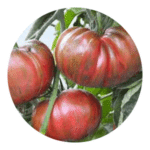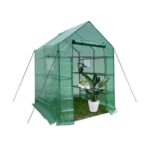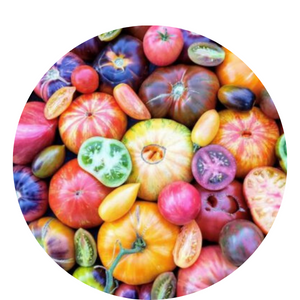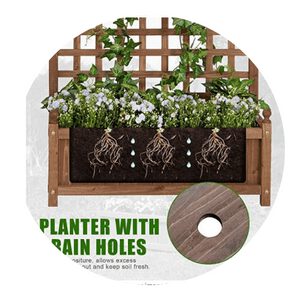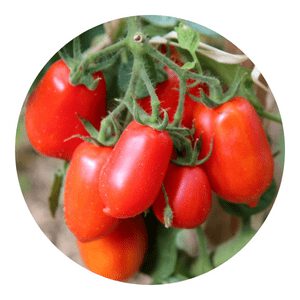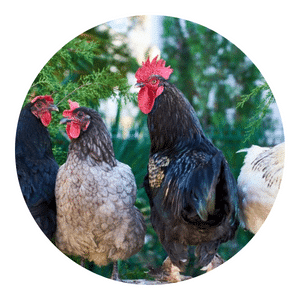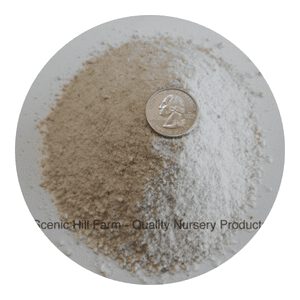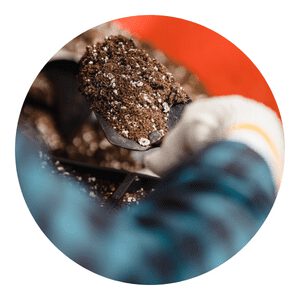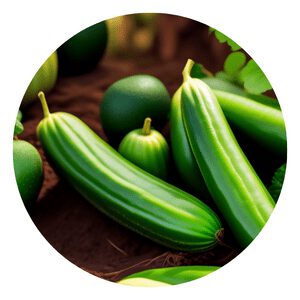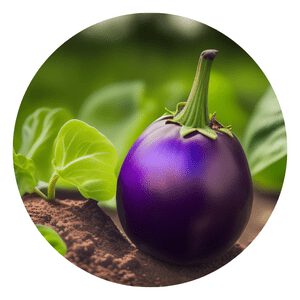How Many Tomatoes Do You Get From One Plant?
If you’ve got a garden, chances are you’ve grown tomatoes at some point.
Whether in a container or in the ground, there’s something satisfying about biting into a homegrown tomato.
But how many do you get from one plant?
To find out, we planted three different types of tomatoes in three containers and counted how many fruits were produced per plant.
The results?
All types of tomatoes yielded an average of about 18 fruits per plant, but Roma tomatoes yielded the most with an average of 30 fruits per plant.
Tomato Menu
Types of Tomato Plants thats grow a lot of crop
There are many types of tomato plants that can be grown for a crop.
Some of the most popular varieties include cherry, grape, and Roma tomatoes.
These plants are relatively easy to grow and can produce a large quantity of fruit in a relatively short period of time.
Determinate vs. Indeterminate Plants:
Determinate plants will typically produce fewer tomatoes than indeterminate plants.
When you are planning to grow tomatoes, it is important to decide what type of plant you want. There are two types of plants: determinate and indeterminate.
Determinate plants will typically produce fewer tomatoes than indeterminate plants. However, the tomatoes that they do produce will be of a uniform size.
Indeterminate plants will produce more tomatoes, but they will be of varying sizes.
When it comes to growing tomatoes, determinate plants are usually better. They produce the fruit in shorter periods of time, which means you can harvest more tomatoes quicker.
Planting and Care:
It is important to plant your tomato plants in a sunny location and to water them regularly.
Tomatoes are a popular vegetable to grow in home gardens.
They are a warm-season crop and can be planted outdoors after the last frost has passed. Tomato plants need at least 6 hours of sunlight per day.
They should be watered regularly, especially when it is hot and dry.
Fertilize tomato plants with a organic fertilizer every 2 to 4 weeks.
Mulch around the plants to help retain moisture and reduce weed growth.
harvest tomatoes when they are fully red and firm.
Tomatoes ripen at different times:
Not all tomatoes will ripen at the same time, so be sure to check your plants frequently.
Tomatoes grow on a vine and ripen at different times.
The tomatoes at the top of the vine will ripen first, followed by the tomatoes on the bottom of the vine.
The tomatoes that are closest to the ground will ripen last. Check your tomatoes every few days to see if they have ripened.
How can I increase the yield of my tomato plants?
In order to increase the yield of your tomato plants, you need to make sure that they are healthy and strong.
One way to help them grow is by feeding them a balanced diet of nutrients.
Tomatoes also need plenty of water, so make sure to water them regularly.
If you live in a warm climate, you may also need to provide some shade for your plants during the hottest part of the day.
How do you increase fruiting in tomatoes?
When it comes to the garden, few things are as rewarding as harvesting homegrown tomatoes.
While tomatoes are relatively easy to grow, getting them to fruit can sometimes be a challenge.
Here are a few tips on how to increase fruiting in tomatoes:
1. Make sure your plants have plenty of sunlight.
Tomatoes need at least 6 hours of direct sunlight per day.
2. Keep the soil moist, but not wet.
Tomatoes do best when the soil is moist but not soggy.
3. Feed your plants with a balanced fertilizer once a week.
4. Prune off any flowers that form on the plants other than the ones you want to turn into tomatoes.
This will help redirect the plant’s energy towards fruiting instead of flowering.
5. Harvest your tomatoes regularly.
What makes tomatoes produce more?
Tomatoes are a popular garden crop because they are relatively easy to grow and they produce a lot of fruit.
But what makes some tomatoes produce more than others? The answer to that question is still being studied, but scientists have found that the amount of sunlight a tomato plant receives affects how much fruit it produces.
What is the best organic fertilizer for tomatoes?
Organic fertilizers are made from natural materials like animal manure, compost, and plant-based materials.
They are broken down by bacteria and other organisms to create a nutrient-rich material that can be used to improve the soil.
When it comes to tomatoes, there are a number of different organic fertilizers that can be used.
One of the most popular organic fertilizers for tomatoes is
fish emulsion. Fish emulsion is made from ground up fish parts and is high in nitrogen. It can be used as a foliar spray or added to the soil.
Another popular organic fertilizer is compost. Compost is made from decomposed organic matter like leaves, grass clippings, and food waste.
It is high in nitrogen, phosphorus, and potassium, which are essential nutrients for tomatoes.
How horse manure can help your tomato plants thrive
Tomatoes love horse manure. The extra nitrogen in horse manure helps promote growth, and the manure also enriches the soil with other nutrients that tomatoes need to thrive.
Horse manure is especially beneficial for tomatoes if it is composted first. Composting breaks down the nitrogen so that it’s more available to plants, and it also reduces the risk of burning the plants with too much nitrogen.
You can compost horse manure yourself, or you can buy it already composted from a nursery or garden center.
If you use fresh horse manure, be sure to age it first by spreading it out in a dry, sunny spot and letting it sit for six months to a year. This will help to reduce the risk of burning your plants.
How cow manure can help your tomato plants thrive
If you’re a gardener, chances are you’ve considered using cow manure to help your plants thrive.
After all, cow manure is rich in nutrients and can be a great way to add fertility to your soil.
However, you may be wondering whether cow manure is really the best option for your tomato plants.
Here’s a look at some of the benefits of using cow manure on your tomato plants:
Cow manure is rich in nitrogen, which is an essential nutrient for healthy plant growth.
Cow manure can also help increase the water-holding capacity of your soil, which is especially important during hot, dry summer months.
Cow manure can also help improve drainage in heavy clay soils.
Overall, using cow manure on your tomato plants can give them a real boost and help them thrive.
How rabbit manure can help your tomato plants thrive
Rabbit manure is an excellent source of nutrients for your tomato plants. It is high in nitrogen and phosphorus, which are essential for healthy plant growth.
Rabbit manure also contains a variety of other minerals that can help your plants thrive.
Applying rabbit manure to your tomato plants will give them a boost of nutrients that will help them grow healthier and produce more fruit. The high nitrogen content in rabbit manure will help promote leaf growth, while the phosphorus will encourage strong root growth. Both of these factors will lead to healthier, more productive plants.
In addition to its nutrient content, rabbit manure also contains helpful microbes that can improve the health of your soil.
These microbes will help break down organic matter and release nutrients that your plants can use. This process will also improve drainage and aeration in your soil, both of which are important for healthy plant growth.
How goat manure can help your tomato plants thrive
Tomatoes love nitrogen and one of the best sources of nitrogen is goat manure.
Goat manure is also a good source of other nutrients that tomatoes need such as phosphorus and potassium.
Applying goat manure to your tomato plants will help them thrive.
Goat manure is high in nitrogen, which is one of the main nutrients that tomatoes need. Nitrogen helps tomato plants grow strong and produce lots of fruit.
Goat manure also contains other important nutrients for tomatoes, such as phosphorus and potassium. These nutrients help tomato plants grow healthy roots and produce more fruit.
Applying goat manure to your tomato plants will give them a boost of essential nutrients that will help them thrive.
For best results, apply fresh goat manure to the soil around your tomato plants once a month.
Your plants will thank you with an abundance of delicious fruits!
How fish manure can help your tomato plants thrive
Fish manure is an excellent fertilizer for tomatoes. It is high in nitrogen and phosphorus, two nutrients that are essential for tomato growth.
Fish manure also contains other beneficial nutrients such as potassium and magnesium.
Applying fish manure to your tomato plants will give them a boost of nutrients that will help them thrive. Fish manure is best applied before planting, or as a side dressing during the growing season. Apply it at the base of the plant, taking care not to get any on the leaves.
If you are using fish emulsion, be sure to dilute it before applying it to your plants. Fish emulsion can burn plants if it is applied undiluted.
When used as directed, fish emulsion is a safe and effective way to fertilize your tomato plants and give them the nutrients they need to thrive.
How donkey manure can help your tomato plants thrive
Donkey manure can help your tomato plants thrive in several ways.
First, donkey manure is high in nitrogen, which is an essential nutrient for tomatoes.
Second, the manure helps to improve drainage and aeration in the soil, which allows the roots to better access water and nutrients.
Finally, the Donkey manure also contains significant amounts of phosphorus and potassium, two other nutrients that are important for healthy tomato plants.
In general, using donkey manure as a fertilizer will result in healthier, more productive tomato plants.
However, it is important to note that too much nitrogen can actually be detrimental to tomatoes, so it is important to use the manure sparingly and only as needed.
How sheep manure can help your tomato plants thrive
Sheep manure can help your tomato plants thrive by providing them with essential nutrients that they may not be getting enough of from the soil.
The nitrogen in the manure will help to promote growth, while the phosphorus and potassium will help to encourage flowering and fruit production.
Sheep manure is also high in organic matter, which will improve the structure and drainage of the soil, and keep the roots of your plants healthy.
How chicken manure can help your tomato plants thrive
Chicken manure can help your tomato plants thrive in a number of ways.
The high nitrogen content in chicken manure is ideal for tomatoes, and the manure also contains other nutrients that are essential for plant growth.
Chicken manure can also help to improve the drainage and aeration of the soil, both of which are important for healthy tomato plants.
How bone meal can help your tomato plants thrive
Bone meal is an excellent source of nutrients for tomato plants. It is high in phosphorus and nitrogen, two elements that are essential for plant growth.
Bone meal also contains calcium, which is beneficial for tomato plants. Calcium helps to prevent blossom end rot, a common problem with tomatoes.
To use bone meal, simply mix it with water and apply it to the soil around your tomato plants.
You can also add bone meal to your compost pile. Bone meal will help your tomato plants thrive and produce healthy fruit.
How blood meal can help your tomato plants thrive
Tomatoes are one of the most popular vegetables to grow in home gardens, and for good reason. They’re relatively easy to grow, they produce an abundance of fruit, and they taste great.
But even the most experienced tomato growers can have problems with their plants from time to time.
One way to give your tomato plants a boost is to add blood meal to the soil.
Blood meal is a natural fertilizer made from dried and powdered blood. It’s rich in nitrogen, which is an essential nutrient for healthy plant growth.
Nitrogen is especially important for tomatoes because it helps them produce more chlorophyll, which gives the plants their green color and helps them absorb more sunlight for photosynthesis.
Blood meal also contains other minerals that tomatoes need, such as phosphorus and iron.
Does pruning tomatoes increase yield?
Tomatoes are a popular garden vegetable.
Many gardeners want to know if pruning tomatoes increases yield. The answer is yes, pruning tomatoes does increase yield but there is a right way and wrong way to do it.
Pruning tomatoes involves removing the suckers, which are the shoots that grow between the main stem and branches.
removing the suckers encourages the plant to produce more fruit. Tomatoes can be pruned by hand or with scissors.
Click To Grow
Helps Us Grow – Share If You Like

